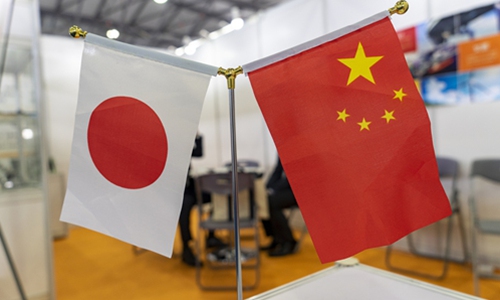Japan is not Australia, urged to be neutral: Global Times editorial
Source:Global Times Published: 2020/5/26 21:53:54

Photo: VCG
Japanese Prime Minister Shinzo Abe said Monday at a news conference that the novel coronavirus spread from China. He said the US is the only ally of Japan, that the two countries share common values and should cooperate on various international affairs. Abe also said China is a very important country, and the international community wishes to see both Japan and China take responsible measures for regional peace, stability and prosperity.
Abe has obviously catered to Americans' feelings when asked by journalists to pick sides between China and the US. But, at the same time, it seemed that Abe wanted to avoid irritating the Chinese side. Especially with reference to COVID-19, he used the word "spread" rather than "originate."
During a press briefing on Tuesday, Chinese Foreign Ministry spokesperson Zhao Lijian said that the origin of COVID-19 is a serious scientific issue, politicizing it and using it to stigmatize others go against the efforts and expectations of the international community, including China and Japan, in jointly fighting the pandemic. Zhao stressed that "indiscriminate political allegiance shall never take precedence over scientific judgement."
The US-Japan alliance is the keystone to Japan's diplomacy. Therefore, when there is a conflict between the US and China, Washington would put pressure on Tokyo, making it difficult for Tokyo to deviate from the path of dealing with Washington's feelings carefully.
Beijing-Tokyo relations are normalizing. Japan should try to stay neutral between China and the US, rather than picking a side publicly like Australia. The response from the Chinese Foreign Ministry can be seen as an important reminder to Japan.
China-Japan ties and China-South Korea ties are both making headway. Negotiations on a trilateral free trade agreement among the three countries are underway. Japan is promoting the Chinese leader's state visit to Japan this year. Such general trend in the region's relations deserves to be cherished by all of the three sides.
Japan is maintaining close ties with the US. China understands it and will not intervene. However, the US-Japan alliance cannot be used as a matter of course if Japan chooses to be inclined to its ally rather than the justified side amid the China-US confrontation.
Some countries will sway as China-US competition intensifies. China should be tolerant enough and maintain its principles. China should try to unite most countries, while not letting this process jeopardize its major interests. When China is propelled to compete with the US in the long run, such a balance is of great significance.
It is crucial for Chinese society to maintain a collective view and confidence against this backdrop. Washington adheres to a hegemonic diplomacy with "America First" at the center, which is detested by the international community, including Western countries. China, which adopts a cooperative mentality, could win more support.
The US could only woo the distancing West with the ideological bond to form an anti-China front. Chinese society needs to make more efforts to break the camp. In that case, Washington is bound to be isolated on the world stage.
As long as we reduce ideological frictions between China and the West, expand common interests between China and other countries, deal with territorial disputes at our periphery well, we can win more international support and initiative when competing with the US, whose overall strength is declining but whose ambition is expanding.
China should be confident that any country with common sense will not lean toward the US, as doing so does not fit its national interests. The countries will strike a balance between Beijing and Washington. Australia is an exception. It is more pro-US than most Western countries because of its geographic position and concerns of being marginalized in the Western world.
China should dedicate itself to encourage other countries remain where they are now in terms of their posturing between China and the US, or move closer to China.
From an extended perspective, this is determined by whether China's development can be more attractive and how China can tactically utilize such attraction. We should reduce unnecessary conflicts with other countries and establish consensus to maintain and develop ties.
Posted in: EDITORIAL